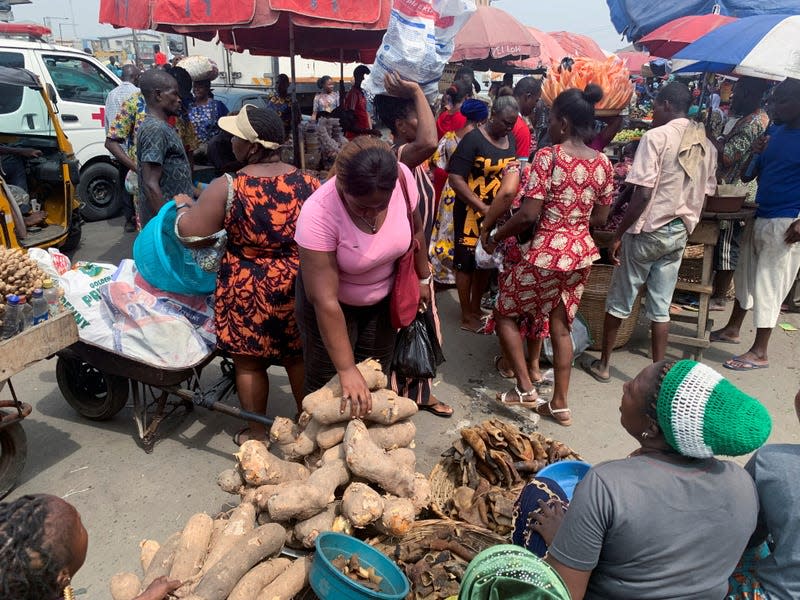It was a tough Christmas for most Africans

While Christmas has always been an expensive time for most households, this year in particular was very difficult for most Africans. International money transfer company, World Remit, estimates that most households spend 156% of their monthly income during the holiday season. This year, that percentage was even larger at a time when most African households are making much less than in previous years.
From historical food inflation rates, low purchasing power, hiked fares, power cuts, and unpaid Christmas bonuses to civil war, and food insecurity, Africa had one of its worst Christmas moments in recent years.
Read more
Africa’s economic hardships this year saw many city dwellers unable to travel upcountry to join their families in festivities due to high costs of transport.
In Ghana, where inflation hit 50.3% in November, the prices of rice, cooking oil, vegetables, chicken, and Christmas decorations tripled this year compared to last year, while that of clothes and shoes also rose with one shopper telling the Ghana News Agency that “I’ve been moving from one place to the other since I came to the market to get some moderate price but to no avail.”
Survival first
Low purchasing power meant only a few Nigerians could afford to buy Christmas gifts for their loved ones this year, with the usual demand for rice, chicken, and clothing driving up costs.
“I told myself that if we must survive, the issue of buying chicken, rice, and clothing won’t be a priority,” Musa Dogo who works in Abuja told the Daily Post.
Economists have attributed this to economic pressures in Nigeria such as a 21.47% year-on-year inflation, unabated insecurity, a 33.3% unemployment rate, high poverty rate, and a slow GDP growth rate this year.
Power blackouts
In South Africa, on top of rising cost of food, clothing, and gifts, many parts of the country suffered power cuts during the festive season. There have been more than 160 days of load shedding in 2022 with the situation escalating in the last two weeks of December where businesses and families had to put up with as many as seven hours without electricity each day.
“Many businesses have to buy generators and diesel, or provide alternative sources of energy to keep operating,” Tshifhiwa Tshivhengwa, CEO of the Tourism Business Council of South Africa, told Xinhua.
The case was similar in Zimbabwe just days to Christmas, with the mayor of the capital Harare, Jacob Mafume, switching on power for people to celebrate saying that “at least today we have it [power] and we hope that as we go forward the lights will not go out.”
But this year’s celebrations there paled in comparison to those of previous years as the city experienced the highest inflation in the world in December, at 321% (pdf), according to a World Bank food security update.
Truncated shopping lists
In Kenya, it was a Christmas of minimal shopping, with many companies opting not to gift employees hampers and vouchers due to the country’s tough economic times. The season’s budget also shrank due to sharp hikes in non-food essentials such as electricity, fuel, and beer.
And as inflation pushed up the prices of goods by 45%, consumer spending shifted to services. “I took my three children out for swimming and go-karting instead of buying them new clothes and shoes like last year. That saved me $80 per child,” Grace Mutua, a school teacher in Nairobi told Quartz.
In neighboring Tanzania, fuel prices have more than doubled compared to last year, making both passenger and cargo transport expensive. “We spend so much more on fuel than what we earn from what we are contracted to transport,” Dickson Salewa, an Arusha-based lorry driver told The Citizen.
There is imminent food scarcity in the country due to erratic rains but the situation is not worse than in Somalia, where more than 90% of its population has insufficient food.
Shrinkflation was evident in the streets of Kampala on Christmas Day. There was significant reduction in the size of Uganda’s street delicacy ‘rolex’ (vegetable omelet rolled inside a flat bread) as vendors struggled to attract customers without raising the price. This is attributable to the rise in the cost of wheat, eggs, vegetables, spices, and cooking gas.
In Rwanda, citizens had to contend with record food inflation that saw prices of items like bread, cereals, dairy products, and beverages skyrocket. Food inflation shot up by 45.4% weeks ahead of Christmas, pushing many delicacies out of reach of many families’ pockets. The price of vegetables alone soared by 82.5%.
Insecurity
In the DRC, hundreds of thousands of residents did not enjoy the festivities as they live in fear, having been terrorized by M23 rebels in the eastern part of the country.
In the displacement camps north of Goma, many families, worried about where to get the next meal. “I can’t celebrate because I don’t have anything to eat,” Olive Pandezi told the AFP from her makeshift hut in Kanyaruchinya, a hillside area near Goma, 2,656 kms east of the capital Kinshasa.
In Mozambique, contracted civil servants had to celebrate Christmas without the usual salary bonus after the government announced salary cuts on Dec 13. Citing budget constraints, president Filipe Nyusi said “The moment demands cost containment and some sacrifices.”
As the continent goes into 2023 in the midst of global inflation, not much is expected in the reduction of food prices and families can only brace themselves for tougher times ahead.
More from Quartz
Sign up for Quartz's Newsletter. For the latest news, Facebook, Twitter and Instagram.
